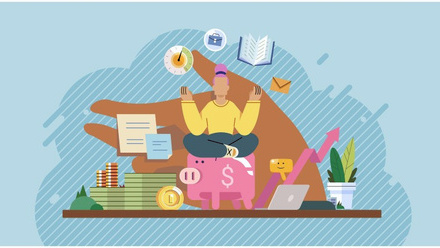Why the secret to delivering real and lasting change is small, simple and steady
“Take this and see if there’s any change in the morning.”

Getting into the swing of 2018, I went in search of a joke that combined money, wellbeing and change. All three being very topical subjects at the beginning of a year. Perhaps you joined a gym, had a ‘dry January’ or became a vegan. Maybe you did some budgeting or grumpily filled in your tax return. Most of us will have made at least one resolution to change or improve something in 2018. By February, many of us will have already reverted to type.
So, what is the secret to helping your employees achieve real and lasting change that genuinely improves their wellbeing? My view is that it needs to be easy to understand, simple to do and rewarding. It doesn’t need to be fast. Quick fixes don’t tend to work long term.
In the spirit of ‘gentle evolution’ being the way forward, here are my small, simple and steady tips for each of the three core pillars of employee wellbeing:
Financial wellbeing
Being financially resilient has much more to do with how we manage our money than with our level of income. For most people, the first step towards financial wellness is getting their budget right for the long term. This starts with an honest evaluation of what comes in and what goes out of their bank account. Once the basic ‘accounts’ are understood, it’s about having a plan and sticking to it (slowly turning the ship).
There are lots of ways to reduce day-to-day living costs, such as these four simple money-saving tactics:
- Consider a credit card balance transfer and maybe cut up the offending one(s).
- Beat up utilities/data/broadband/home entertainment suppliers on price – there are deals to be had and switchers are normally the winners.
- Use discount shopping websites – good employers have them, but Quidco and TopCashBack are also available for anyone to use. They help save money on everyday spending – and this can really add up over the years.
- Be bold – cancel a few non-essential direct debits. It’s very satisfying.
Workplace financial education tools and programmes can help employees learn how to effectively budget and manage their money, as well as how to obtain maximum value from the benefits available from their employer.
Physical wellbeing
Joining a gym and training frantically throughout January, then being mainly sedentary for the rest of the year isn’t going to help. It’s about making small changes for life. A couple of years ago, I read that you lose two pounds of muscle every year from the age of 50.
Horrified that this was in fact me, I have been doing the 12 core exercises they suggested three to four times per week ever since. My waistline has dropped by three inches, which apparently means I’m less likely to have a coronary scare. Encourage your workforce to find their thing and fall in love with it. Mine was learning to row.
Great employers are now embracing the importance of good health at work – and recognising that this means more than simply providing some form of medical benefit or discounted gym membership.
Emotional wellbeing
Once a taboo subject, particularly in the workplace, there has been a revolutionary shift of attitude towards any level of emotional fragility or mental instability. There is still work to be done to remove all the stigma but, for many employers, mental wellbeing is very high on the agenda.
Employee assistance programmes (EAPs) are now fairly commonplace, and I can personally attest to the effectiveness of this type of telephone-based support. The best employers are taking this to a higher level by including mindfulness sessions, health incentivisation technology and even counselling drop-ins.
Simply making sure your employees are aware of the tools and support available to them can be the first crucial step in helping them improve their overall wellbeing. In many cases, you’re already paying for the benefit or service. Makes sense that everyone should receive maximum benefit for your spend.
And finally, here are the top four ‘change’ related things that kept popping into my head while writing this article:
1) Change4Life
This programme, run by the Department of Health in England, began in January 2009 and was the first national social marketing campaign to tackle obesity. As someone who once had a BMI bordering on obese (over a decade ago), it saddens me that obesity levels are still rising. For many people it is simply a matter of awareness and education. I am delighted to see many employers now encouraging healthy eating and exercise as part of their holistic wellbeing strategy.
2) David Bowie’s Changes
This single was released from the late, great Thin White Duke’s Hunky Dory album in 1971. All together now… “Ch-, ch-, ch-, changes… turn and face the strange….”
I defy you not to have that as your earworm for the rest of the day!
3) Dr Who
For decades now we have waited with great anticipation for each change. Who will be the next Doctor, as he or she regenerates? Great to see gender is no longer a barrier, or in fact age. Matt Smith to Peter Capaldi was a bold but excellent move at the time.
4) Change from parking ticket machines
More accurately, the lack of it. I find it maddeningly and wholly wrong that so many parking machines will not give change. Nor will they credit your car park stay with the extra money you had to shove in because you didn’t have the exact coin combination. £1.20 per hour, but you have three £1 coins. So, you pay £3 and get no change, but still only get two hours of parking instead of the extra half an hour you paid for. Grrrr.
Anyway, rant over. Until next time.
“Ch-, ch-, ch-, chaaaaanges!”
James Biggs is consulting and wellbeing director at Lorica.
This article was supplied by Lorica.
Supplied by REBA Associate Member, Lorica Workplace
Lorica has one simple aim: to help people develop a healthy relationship with money.







